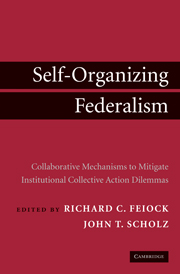 Self-Organizing Federalism
Self-Organizing Federalism Book contents
- Frontmatter
- Contents
- List of Figures
- List of Tables
- Contributors
- Preface
- PART ONE SELF-ORGANIZING VERSUS CENTRALIZED SOLUTIONS TO INSTITUTIONAL COLLECTIVE ACTION PROBLEMS: THEORETICAL CONSIDERATIONS
- PART TWO INTEGRATING METROPOLITAN SERVICE PROVISION: NETWORKS, CONTRACTS, AGREEMENTS, AND SPECIAL DISTRICTS
- 5 Adaptive versus Restrictive Contracts: Can They Resolve Different Risk Problems?
- 6 Do Risk Profiles of Services Alter Contractual Patterns? A Comparison across Multiple Metropolitan Services
- 7 Special Districts versus Contracts: Complements or Substitutes?
- 8 The Political Market for Intergovernmental Cooperation
- PART THREE INTEGRATING REGIONAL POLICIES THROUGH NETWORKS, JOINT VENTURES, AND PARTNERSHIPS
- PART FOUR SELF-ORGANIZING GOVERNANCE AND INSTITUTIONAL COLLECTIVE ACTION
- References
- Index
5 - Adaptive versus Restrictive Contracts: Can They Resolve Different Risk Problems?
from PART TWO - INTEGRATING METROPOLITAN SERVICE PROVISION: NETWORKS, CONTRACTS, AGREEMENTS, AND SPECIAL DISTRICTS
Published online by Cambridge University Press: 29 January 2010
- Frontmatter
- Contents
- List of Figures
- List of Tables
- Contributors
- Preface
- PART ONE SELF-ORGANIZING VERSUS CENTRALIZED SOLUTIONS TO INSTITUTIONAL COLLECTIVE ACTION PROBLEMS: THEORETICAL CONSIDERATIONS
- PART TWO INTEGRATING METROPOLITAN SERVICE PROVISION: NETWORKS, CONTRACTS, AGREEMENTS, AND SPECIAL DISTRICTS
- 5 Adaptive versus Restrictive Contracts: Can They Resolve Different Risk Problems?
- 6 Do Risk Profiles of Services Alter Contractual Patterns? A Comparison across Multiple Metropolitan Services
- 7 Special Districts versus Contracts: Complements or Substitutes?
- 8 The Political Market for Intergovernmental Cooperation
- PART THREE INTEGRATING REGIONAL POLICIES THROUGH NETWORKS, JOINT VENTURES, AND PARTNERSHIPS
- PART FOUR SELF-ORGANIZING GOVERNANCE AND INSTITUTIONAL COLLECTIVE ACTION
- References
- Index
Summary
Studies of interjurisdictional activities often define contractual arrangements as simply a means to protect local government transactions and procedural rights. Instead, we argue that interlocal agreements constitute a set of special relations, which we refer to as “contractual ties” among governments. Depending on the types of agreements adopted, a network of contractual ties provides local governments with a means of mitigating mutual institutional collective action (ICA) problems by creating potential access to an array of tangible and intangible resources that exist outside each government's organizational boundaries (Gulati 1998). When local officials enter into short- or long-term contracts, their interactions can lead to regular and sophisticated systems of communication (Thurmaier and Wood 2002). It is through repeated interactions that local officials can judge the trustworthiness and legitimacy of their contracting partners, qualities that are crucial for the creation of self-organizing institutions. Contractual ties are embedded in a rich social context in which information and opportunities are exchanged, the risk of opportunistic behavior can be reduced, a cohesive set of preferences can be aligned, and a common interest can be coordinated and mobilized (Maccaulay 1963; Shapiro, Sheppard, and Chraski 1992; Jones, Hesterly, and Borgatti 1997).
The substantive focus of this study is on the emergence of contractual ties among local government law enforcement departments, emergency medical services, and fire departments within a polycentric governance system (McGinnis 1999). Planning for emergency quick response and recovery efforts often requires local entities to enter into strings of formal and informal agreements.
- Type
- Chapter
- Information
- Self-Organizing FederalismCollaborative Mechanisms to Mitigate Institutional Collective Action Dilemmas, pp. 91 - 113Publisher: Cambridge University PressPrint publication year: 2009
- 3
- Cited by


